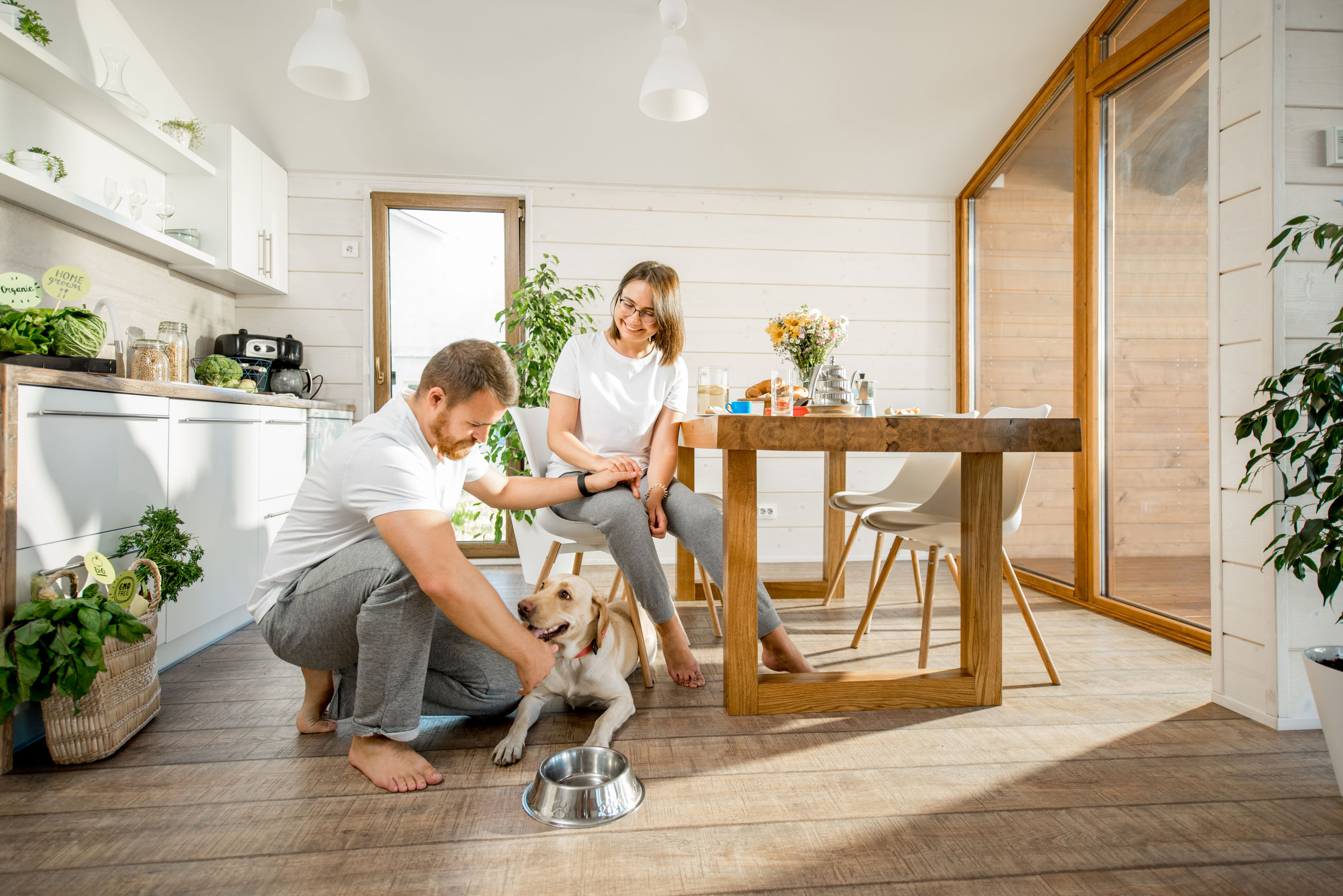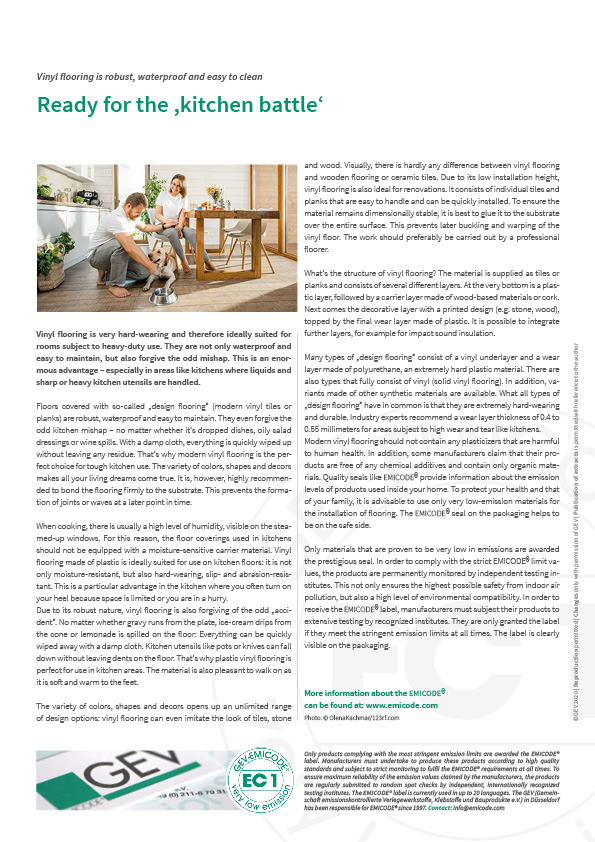Ready for the “kitchen battle”
Vinyl flooring is robust, waterproof and easy to clean
Floors covered with so-called “design flooring” (modern vinyl tiles or planks) are robust, waterproof and easy to maintain. They even forgive the odd kitchen mishap – no matter whether it’s dropped dishes, oily salad dressings or wine spills. With a damp cloth, everything is quickly wiped up without leaving any residue. That’s why modern vinyl flooring is the perfect choice for tough kitchen use. The variety of colors, shapes and decors makes all your living dreams come true. It is, however, highly recommended to bond the flooring firmly to the substrate. This prevents the formation of joints or waves at a later point in time.
When cooking, there is usually a high level of humidity, visible on the steamed-up windows. For this reason, the floor coverings used in kitchens should not be equipped with a moisture-sensitive carrier material. Vinyl flooring made of plastic is ideally suited for use on kitchen floors: it is not only moisture-resistant, but also hard-wearing, slip- and abrasion-resistant. This is a particular advantage in the kitchen where you often turn on your heel because space is limited or you are in a hurry.
Due to its robust nature, vinyl flooring is also forgiving of the odd “accident”. No matter whether gravy runs from the plate, ice-cream drips from the cone or lemonade is spilled on the floor: Everything can be quickly wiped away with a damp cloth. Kitchen utensils like pots or knives can fall down without leaving dents on the floor. That’s why plastic vinyl flooring is perfect for use in kitchen areas. The material is also pleasant to walk on as it is soft and warm to the feet.
The variety of colors, shapes and decors opens up an unlimited range of design options: vinyl flooring can even imitate the look of tiles, stone and wood. Visually, there is hardly any difference between vinyl flooring and wooden flooring or ceramic tiles. Due to its low installation height, vinyl flooring is also ideal for renovations. It consists of individual tiles and planks that are easy to handle and can be quickly installed. To ensure the material remains dimensionally stable, it is best to glue it to the substrate over the entire surface. This prevents later buckling and warping of the vinyl floor. The work should preferably be carried out by a professional floorer.
What’s the structure of vinyl flooring? The material is supplied as tiles or planks and consists of several different layers. At the very bottom is a plastic layer, followed by a carrier layer made of wood-based materials or cork. Next comes the decorative layer with a printed design (e.g. stone, wood), topped by the final wear layer made of plastic. It is possible to integrate further layers, for example for impact sound insulation.
Many types of “design flooring” consist of a vinyl underlayer and a wear layer made of polyurethane, an extremely hard plastic material. There are also types that fully consist of vinyl (solid vinyl flooring). In addition, variants made of other synthetic materials are available. What all types of “design flooring” have in common is that they are extremely hard-wearing and durable. Industry experts recommend a wear layer thickness of 0.4 to 0.55 millimeters for areas subject to high wear and tear like kitchens.
Modern vinyl flooring should not contain any plasticizers that are harmful to human health. In addition, some manufacturers claim that their products are free of any chemical additives and contain only organic materials. Quality seals like EMICODE® provide information about the emission levels of products used inside your home. To protect your health and that of your family, it is advisable to use only very low-emission materials for the installation of flooring. The EMICODE® seal on the packaging helps to be on the safe side.
Only materials that are proven to be very low in emissions are awarded the prestigious seal. In order to comply with the strict EMICODE® limit values, the products are permanently monitored by independent testing institutes. This not only ensures the highest possible safety from indoor air pollution, but also a high level of environmental compatibility. In order to receive the EMICODE® label, manufacturers must subject their products to extensive testing by recognized institutes. They are only granted the label if they meet the stringent emission limits at all times. The label is clearly visible on the packaging.

Photo: @OlenaKachmar/123rf.com
Vinyl flooring is very hard-wearing and therefore ideally suited for rooms subject to heavy-duty use. They are not only waterproof and easy to maintain, but also forgive the odd mishap. This is an enormous advantage – especially in areas like kitchens where liquids and sharp or heavy kitchen utensils are handled.

Do You Have Questions?
If you have any questions on certain topics or want to contact us for another reason, please contact us by phone or email.
Phone: +49 (0)211 843 449 – 01
info@emicode.com
Share article on Social Media:
